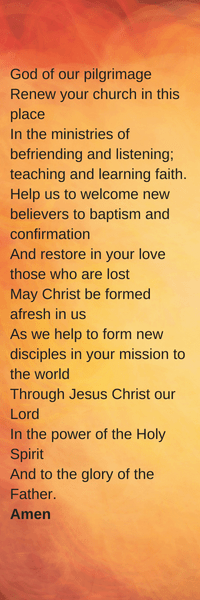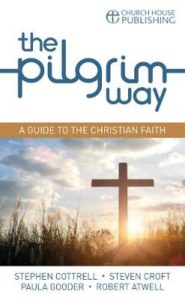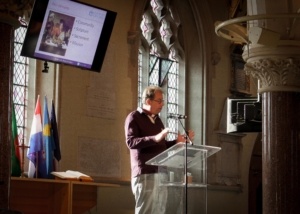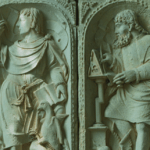It was good to welcome over 450 clergy and LLM’s to five different Bishop’s Study Days across the Diocese of Oxford in November. We welcomed a guest theologian at each of the study days who gave us a deep dive into the Christian tradition. Their addresses will be published later this year in a new book called Rooted and Grounded: Faith formation and the Christian tradition. This is the text of my opening address to those days.
—
A Christ-like Church for the sake of God’s world
We are exploring together what it means to be a more Christ-like Church for the sake of God’s world: more contemplative, more compassionate and more courageous.
As you cannot help but notice, Jesus teaches people about God in particular ways – something which is emphasised in different ways in all four gospels in what they contain and in the way they are written.
These five days are about being more Christ-like in seeking to renew, and be renewed, in the ministry of teaching and learning the faith. Especially the cluster of disciplines and practises focussed around welcoming children and young people, and families and adults, into Christian faith. Walking with them to baptism and confirmation and seeing people established in Christian discipleship.
The Church calls these disciplines catechesis.
Each of the four gospels is written to support this ministry. In Luke 1.4 we read these things are written “so that you may know the truth concerning the things about which you have been catechised.” This is to deepen your formation.
As we look back over the long history of the Church, we see that in every period of mission, growth and expansion, the church has taken this cluster of ministries really seriously. In each period of church history, the development of catechesis in the practices of the church has been different – there has been much faithful improvisation of the same core principles.
The goal of this day is not to tell you to approach this ministry in a particular way. The goal is to help us together to work with the Spirit in the renewal of catechesis for our own day. Meeting together and listening to God and to one another is a vital part of that. Listening to Scripture and the tradition is a vital part. Seeking God for the renewal of this ministry is vital. I’m very pleased to welcome you as colleagues as we think together about this renewal in our own day.
The vital importance of joy
Towards the end of the fourth century, a deacon called Deogratias wrote to his bishop about this ministry. He is something of a lazy deacon. He asks Augustine his bishop for a sermon he can use for instructing beginnings in the faith. Here are people who want to know more, who are just at the cusp of wanting to learn about faith and baptism. ‘What should I tell them?’
Augustine writes back and offers him a short book: On Instructing Beginners in the Faith. He does supply a sermon – in fact he offers two.
Please don’t take this as a precedent and invite me to write your sermons for you.
The most important thing Augustine says about this ministry is this. Do it with joy. It is joy that will make the difference.
“Our greatest concern is much more about how to make it possible for those who offer instruction in the faith to do so with joy. For the more they succeed in this, the more appealing they will be” – Augustine, On Instructing Beginners in the Faith, 2.4
My prayer for these days is that they will be days of joy when we rediscover together our motivation for forming new Christians in faith.
There is no greater joy than walking with young people and with adults as they discover or rediscover faith in Jesus Christ. On Sunday evening I had the privilege of baptising 7 young people and adults and confirming 15. Every one had a story of God’s love. I guess for most of us the chance to be involved in this kind of formation is very close to our call to ministry. All of us will have had some experience. We know something of that joy.
But that sets up the question of why has this ministry corporately fallen so far down our priorities? By and large clergy don’t feel well equipped in catechesis and nor do lay ministers. We are somewhat de-skilled and our motivation is low. Augustine is also very honest, and he offers Deogratias some reasons for this in his day. They sound very relevant to us today.
We are slow to come to this ministry because we prefer to study deeper things; we have graduated from the ABC of faith. Perhaps we enjoy other activities in ministry more. Perhaps anxiety or scandal distract us. Perhaps our confidence is low. We have lost our first love and because of our long ministry, because it’s so hard, we have become grumpy and disagreeable (not that this could ever happen in the Diocese of Oxford).
Or is it simply that our diary planning is poor? There is always so much to do. This is the one task we want to do but which never comes to the top of the agenda.
I hope these days will provide a way of listening to our different and deep motivations; to rediscover the joy of this ministry; to seek God together for the renewal of this ministry in our Diocese at this time; to find joy in God’s deep call to this work.
I invite you to reflect together at different points through this address with those sitting around you as we’ve done already. This is the first such opportunity. Speak with those around you honestly about your current approach to this cluster of ministries. Do you recognise their importance? What place do they have in your own ministry currently? How much time will you give to this ministry in the coming year? Are you able to offer instruction in the faith with joy?
Seven conversations and seven days of prayer
I began this journey of renewing catechesis in the Diocese of Oxford by inviting together people from every parish and chaplaincy in the two Oxford Deaneries in Lent (2018) in seven conversations over a meal. We agreed together on several things.
- This ministry is vital and life-giving for the renewal of the church
- Renewal of this ministry is timely
- Our world is changing and therefore we may need to do this ministry in new ways
- We sense a shift from small group work to work with individuals
- There is no single programme, but fresh thinking is sorely needed.
- This is a spiritual discipline and the renewal will begin in prayer
- The resources of the past can help us
- A very simple annual cycle loosely interpreted will be a good support
- We do not feel well equipped for this ministry.
We have begun in Oxford this year an attempt at an annual cycle sowing the good seed of the gospel in the autumn; walking with inquirers and new believers to baptism in the Lent and Easter seasons; deepening the faith of every disciple between Pentecost and the autumn.
I made a pilgrimage of prayer to all 46 Anglican churches in the city in September and prayed in and with each congregation for the renewal of catechesis.
This was and is my prayer:

These five study days are the next step on this journey of learning and discovery. At each day I want to offer an overview of the central principles of catechesis. At each day we will have a deep dive into the tradition with a different theologian. At each day there will be a range of practical workshops. At each day we will worship and pray together for this ministry for God’s grace and renewal.
I hope that the days will result in conversation in PCCs and deaneries and chapters.
I hope there will be further study together.
I hope that there will be lots of mutual encouragement.
I hope that there will be changes in practice right across the diocese – not the rolling out of a programme but the rediscovery and deepening of a key discipline for ministry.
We will be drawing all the different plenary contributions together into a handbook on renewing catechesis to be published in the autumn of 2019.
My own contribution to each day will focus on an exploration of how people come to faith as adults, as children and as young people. The question is both a mystery and a vital question for the churches practice.
If we have no idea how people come to faith in Jesus Christ, how can we help and join in and support that process?
If we have some understanding of the process and journey and what makes for good formation then we have a much better idea of how we can join in that process in a way which is helpful, in partnership with the Holy Spirit.
Introducing the Road to Emmaus
Luke is a profound theologian of formation. Luke punctuates his great narrative in the gospel and in Acts with stories which shape our understanding of how people come to faith: the two sons, the sower, the Damascus Road, Zaccheus, Philip on the road to Gaza, Lydia opening her heart and home in Philippi and, at the very centre of the narrative, the story of the journey to Emmaus on the day of resurrection.
Luke tells the story of the resurrection in a single day: at the tomb in the early morning; on the road to Emmaus in the middle of the day; in the upper room and then on the Mount of Olives in the evening. In Luke’s theology, of course, Jerusalem is where the disciples are meant to be between Easter and Pentecost.
To understand the Emmaus Road we need to know that the two disciples when we meet them are travelling in the wrong direction. Once they have recognised the risen Christ, they are turned around, a literal conversion, and return to the city. The Emmaus Road is unique among the Easter stories because the disciples recognise the risen Christ not in extraordinary and unrepeatable miracles, but through the means of grace which are accessible to the Church in every age: first in fellowship, then in scripture, then in the breaking of the bread, and finally in common witness: the Lord is risen.
In the Emmaus Road, Luke helps us to see more clearly and distinguish the four key elements of formation or catechesis. Luke is shining a light through a prism and helping us to see that catechesis is not one element alone. Christian formation is addressed to the whole person. Good, deep, transformative Christian formation embraces each of these elements and weaves between them in any individual journey to faith.
I want to unfold them for us now and then, as it were, put them back together in the faith journeys both of adults and of children. The understanding of catechesis I very much want us to develop together is a catechesis which embraces each and all of them and weaves them into a single whole.
In each of them our call is to be Christ-like.
Listening and forming community
The first element is being with people in their journey, listening and forming community through the asking of gentle questions. It is always very sobering to ask the question, where in Luke’s gospel do we first meet the risen Christ on Easter Day?
The answer is here, on the road to Emmaus, with the two disciples who are walking in the wrong direction. Jesus leaves the 99 and comes in search of the two and spends the whole day with them. Jesus is conscious that the Spirit is at work here beyond the community. Jesus is looking for where God is at work and seeking to join in.
And so the comforting stranger draws near and walks with them. The first time we meet the child Jesus in Luke, his parents, frantic with worry, find him in the temple, sitting and listening and asking questions. Almost the last time we meet Jesus in Luke we find the mirror of that story. The risen Christ’s mode of discourse is not propositional but conversational: ‘What are you talking about as you walk along the road together?’ Jesus listens to the pain. Then he asks again. ‘What things?’ and the story unfolds.
Catechesis builds on gentle pastoral work, being with. Here is our first challenge. For there to be a renewal of catechesis in our churches we must first of all be able to do what the risen Christ does: spend time with people who are going in the wrong direction. We must spend time with people who are outside the Christian community in such a way that we are able to listen and build a depth of relationship and seek out the places and the people where God is at work.
It is no use rooting ourselves within our churches and communities as the world changes around us and shouting our gospel messages every more stridently. We must go to where people are and listen to the questions and pain and grief of the world and seek out the agenda of other people by our careful listening. For that to happen, we need to be contemplative, compassionate and courageous.
Every step in the first part of the journey takes the disciples further away from Jerusalem. There are no quick fixes in formation. We are to fall in step and listen and create community. It is only when trust and welcome have been built that people will be able to listen to what we have to say.
Those communities have been built in different ways throughout the history of the church. They need to be built in different ways today. But that listening and community needs to play a role before the way is open for the second element in the Emmaus story: teaching and interpretation from the scriptures.
Interpreting the scriptures
“Then beginning with Moses and all the prophets, he interpreted to them the things about himself in all the scriptures.”
The two disciples encounter the risen Christ in the breaking open of the word. They are to say to each other later in the day:
“Were not our hearts burning within us while he was talking to us on the road, while he was opening the scriptures to us?”
Formation in all the scriptures plays a key role in our catechesis. How should we frame and shape our teaching in the light of this?
The first and most obvious point is that our catechesis, the content of our learning and teaching flows not from ourselves but from the scriptures. Jesus engagement with the scriptures is first panoramic. The whole story is here from creation to new creation. Jesus engagement with the scriptures is second Christocentric. Jesus interprets the things concerning himself in the all the scriptures.
In the same way, Jesus Christ is to be at the centre of all of our teaching. Jesus’ engagement with the scriptures is interpretation, not simple exposition. We all need help in interpreting and understanding the scriptures. Engagement with the bible of itself does not make strong Christians. We need to learn how to read the bible well and interpret the scriptures as the foundation of our catechesis.
The renewal of catechesis must involve a renewal of our own engagement with scriptures in ways which are panoramic, Christocentric and interpretative. Across the centuries, the great tradition of Christian formation through scripture, the content of our teaching, has focussed on a small number of key texts to be learned by heart. There is wisdom in this great tradition.
Two are always present from the earliest times and in every generation since. The Apostles’ Creed is the key to giving the panoramic view of the story of salvation and of scripture from creation to new creation and the interpretative keys to the scriptures.
Many of the tools for teaching and learning the faith developed over the last thirty years, most notably the Alpha course, have this creedal shape. The Lord’s Prayer is the second text universally used to form and shape faith.
As we anticipate the next great movement in the Emmaus Road story, formation in faith is not only about learning doctrine but about being drawn into a relationship with God in prayer and sacrament. Cyprian was Bishop of Carthage in the third century. He has passed down to us a series of sermons on the Lord’s Prayer in which he expounds the whole gospel through this one text.
At different times in the story of the Church, the most basic catechesis has engaged also with the Commandments as with Luther’s catechism and the Prayer Book catechism and at times also the Beatitudes.
The Church of England report On the Way in the 1990s begins to develop an Anglican understanding of catechesis which continually returns to and is formed by these four great texts. From earliest times, the Church developed simple catechisms in a question and answer format, largely based around these four texts, as a way of teaching the Christian faith to children and young people and adults. The texts and some other material can easily be learned by heart and form the basis for a lifetime’s understanding of faith.
 Last year the Church of England published The Pilgrim Way which is our most recent development of a catechism. The Pilgrim Way was developed by the four core authors of the Pilgrim materials to be a new Anglican catechism. It is based very simply around these four texts and their interpretation in a simple question and answer format. I commend it to you.
Last year the Church of England published The Pilgrim Way which is our most recent development of a catechism. The Pilgrim Way was developed by the four core authors of the Pilgrim materials to be a new Anglican catechism. It is based very simply around these four texts and their interpretation in a simple question and answer format. I commend it to you.
Between 1530 and 1740 we have evidence of more than a thousand catechisms developed in the Church of England. We still have all or part of more than six hundred of them. In this period catechesis is a huge part of the ministry of Anglican clergy. We were required to teach the faith Sunday by Sunday. There are examples of Churchwardens taking their clergy to court if they did not fulfil this ordination promise.
In the mediaeval period, the expectation was just as high. Four times a year the clergy were to expound the faith to their parishioners. The first thing you did on ordination as a deacon was to write and preach your catechetical sermons. We need a rekindling of our passion for learning and teaching faith and Christian formation at a daily and weekly level in our ministries.
Formation in prayer and the sacraments
The third and fourth great movements in the Emmaus Road story I have partly anticipated and will address more briefly.
“As they came near the village to which they were going, he walked ahead as if he were going on”.
There is something of the gentleness of true Christian catechesis here – making space for the inquirer and for personal response.
“But they urged him strongly saying, ‘Stay with us, because it is almost evening and the day is now nearly over’.
There is a strong Lukan irony in that little phrase.
“So he went in to stay with them. When he was at the table with them, he took bread, blessed and broke it and gave it to them. Then their eyes were opened and they recognised him, and he vanished from their sight”.
Later again they will tell to each other and to the main group of disciples:
“how he had been made known to them in the breaking of the bread”.
Christian formation is not formation in knowledge or understanding but in relationship. Our understanding leads us into friendship with God and love for God. That relationship is expressed in prayer and in the sacraments. A key part of Christian formation is nurturing this relationship and encounter with God in many different ways.
Again, where formation is effective in the Church today, you can see the evidence of quiet days and retreats, Holy Spirit weekends, parish weekends and conferences, visits to New Wine or Walsingham or Soul Survivor where there is an opportunity to meet with God in worship, prayer and sacrament and for that encounter and relationship to deepen and to grow.
Renewal in catechesis means continually to deepen and resource that strong spiritual centre to the life of our churches and schools so that there is space for encounter with God in the ordinary and in the special and particular moment.
Formation in Christian mission
Finally, the fourth movement is the return journey back from Emmaus to Jerusalem and the bearing witness to this encounter with the risen Christ in the upper room with the disciples and from there in the whole of their lives.
We are formed in our Christian faith through being sent out as well as through being drawn together. We are called to live in the dynamic rhythm of drawing near to God’s grace in community and fellowship and being sent out to live to God’s glory. A profound part of Christian formation and catechesis is learning how to live out our faith in different ways.
John and Charles Wesley and their colleagues made a significant contribution to reimagining catechesis in their generation. They rediscovered the importance of moving outside the church in listening and community and telling the story of the good news as Wesley began to preach to the miners in Bristol in the open air.
There were many powerful instances of conversion. But the movement grew and deepened because Wesley built places of formation and catechesis in the bands and the class system. These were places where above all the new Christians learned to live out their faith in everyday life through giving an account to one another and through reflection on scripture in the light of everyday discipleship.
Renewing catechesis
Renewal in catechesis is about more than the implementation of a programme. Indeed I do not have a programme for you to implement.
 It is about the renewal of the time we spend outside the Christian community, listening and asking questions and forming community.
It is about the renewal of the time we spend outside the Christian community, listening and asking questions and forming community.
It is about the renewal of our understanding of the scriptures and our ability to teach them to those who are inquirers and new Christians.
It is about the renewal of our life of prayer and sacrament and enabling moments of significant encounter with the risen Christ.
It is about deepening our support to all of us to live out the Christian faith through communities of mutual support.
At the beginning of this presentation, I invited you to tell your own story. I invite you now as I draw to a close to reflect on the ways in which these different elements played their part in your own journey of faith. It may be that you would emphasise one more than the other, but see if you can reflect on your own story and the mystery of God’s work in you differently in the light of this story.
It seems to me as adults come to faith that these four will often play a part over a timespan of several years, not always in the same order, as something awakens a search for faith, that search is met with gentle listening and friendship which evokes an honest questioning and enquiry.
That, in turn, leads to an openness to learning from the scriptures and in different ways encounters with God in prayer and sacrament and a desire to be changed and to live differently, which again evokes a need for deeper learning, community and support.
For a child or young person, all of these elements need to be present through their experience of church and school: being held in friendship and community; opportunities to learn the faith in different ways according to the scriptures; opportunities for prayer and worship and encounter and a growing understanding of what it means to live out our faith in the whole of our lives.
As parish churches, chaplaincies and schools we are called to provide these four elements of catechesis for adults, for children and for young people not through special events but through the normal everyday life together. Renewing catechesis is about restoring these simple disciplines to the life of our churches and restoring confidence in the life-changing power of the gospel.
—
Bishop Steven will deliver the seminar Preaching as Catechesis at this years’ Festival of Preaching. The festival takes place at Christ Church, Oxford, 8 – 10 September 2019.


